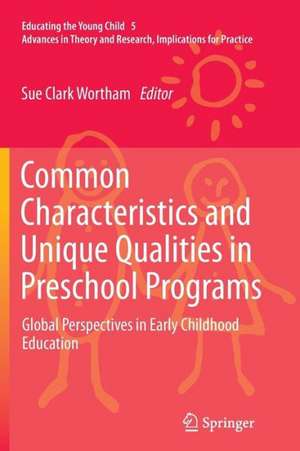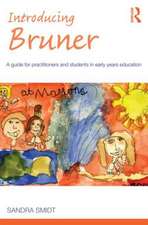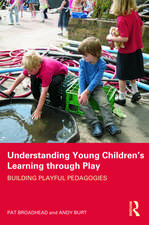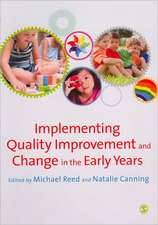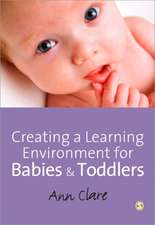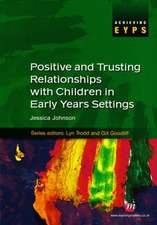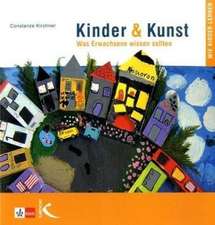Common Characteristics and Unique Qualities in Preschool Programs: Global Perspectives in Early Childhood Education: Educating the Young Child, cartea 5
Editat de Sue C. Worthamen Limba Engleză Paperback – 14 dec 2014
In 1999, a group of educators representing 36 countries developed guidelines for establishing minimum standards for preschool programs. A purpose for developing the guidelines was to provide guidance for countries that wished to evaluate and improve their own programs. A second purpose was to help developing countries initiating preschools to have relevant information about quality programs. The later development of an assessment tool based on the Global Guidelines served as a vehicle to use the guidelines to assess a single program or multiple programs. The continuing work with these guidelines in many countries throughout the world since 2000 has resulted in the collection of information that reveals the uniqueness of programs in different countries.
| Toate formatele și edițiile | Preț | Express |
|---|---|---|
| Paperback (1) | 635.65 lei 6-8 săpt. | |
| SPRINGER NETHERLANDS – 14 dec 2014 | 635.65 lei 6-8 săpt. | |
| Hardback (1) | 641.85 lei 6-8 săpt. | |
| SPRINGER NETHERLANDS – 24 noi 2012 | 641.85 lei 6-8 săpt. |
Din seria Educating the Young Child
- 18%
 Preț: 946.24 lei
Preț: 946.24 lei - 15%
 Preț: 467.46 lei
Preț: 467.46 lei - 15%
 Preț: 647.92 lei
Preț: 647.92 lei - 15%
 Preț: 700.75 lei
Preț: 700.75 lei - 18%
 Preț: 898.75 lei
Preț: 898.75 lei - 18%
 Preț: 783.20 lei
Preț: 783.20 lei - 18%
 Preț: 1005.43 lei
Preț: 1005.43 lei - 18%
 Preț: 888.49 lei
Preț: 888.49 lei - 18%
 Preț: 1003.07 lei
Preț: 1003.07 lei - 20%
 Preț: 563.08 lei
Preț: 563.08 lei - 24%
 Preț: 814.75 lei
Preț: 814.75 lei - 15%
 Preț: 639.25 lei
Preț: 639.25 lei - 15%
 Preț: 635.47 lei
Preț: 635.47 lei - 15%
 Preț: 636.80 lei
Preț: 636.80 lei - 20%
 Preț: 567.32 lei
Preț: 567.32 lei - 18%
 Preț: 996.57 lei
Preț: 996.57 lei - 15%
 Preț: 644.63 lei
Preț: 644.63 lei - 20%
 Preț: 563.40 lei
Preț: 563.40 lei
Preț: 635.65 lei
Preț vechi: 747.82 lei
-15% Nou
Puncte Express: 953
Preț estimativ în valută:
121.63€ • 127.33$ • 100.64£
121.63€ • 127.33$ • 100.64£
Carte tipărită la comandă
Livrare economică 05-19 aprilie
Preluare comenzi: 021 569.72.76
Specificații
ISBN-13: 9789400796737
ISBN-10: 9400796730
Pagini: 200
Ilustrații: XVIII, 182 p.
Dimensiuni: 155 x 235 x 11 mm
Greutate: 0.29 kg
Ediția:2013
Editura: SPRINGER NETHERLANDS
Colecția Springer
Seria Educating the Young Child
Locul publicării:Dordrecht, Netherlands
ISBN-10: 9400796730
Pagini: 200
Ilustrații: XVIII, 182 p.
Dimensiuni: 155 x 235 x 11 mm
Greutate: 0.29 kg
Ediția:2013
Editura: SPRINGER NETHERLANDS
Colecția Springer
Seria Educating the Young Child
Locul publicării:Dordrecht, Netherlands
Public țintă
ResearchCuprins
1. Looking at Early Childhood Programs from a Global Perspective.- Part 1: Background.- 2. Cross-Cultural Collaboration Research to Improve Early Childhood Education.- Part 2: School Environments.- 3. From Montessori to Culturally Relevant Schools Under the Trees in Kenya.- 4. Preschool Environments in Rural West Africa.- 5. Kindergarten Environments in Reggio Emilia, Bologna, Modena, and Parma, Italy.- Part 3: Curriculum Content and Pedagogy.- 6. Kindergartens in Russia’s Far East: The Effect of Climate.- 7. Preserving Cultural Heritage in Korea.- Part 4: Children with Special Needs.- 8. International Perspectives on Services for Young Children with Special Needs.- 9. New Visions for Preschool Inclusive Education in Mexico.- 10. Early Childhood Special Education in China: Advocacy and Practice.- Part 5: The Early Childhood Educator.- 11. Administrators, Teachers, and Nineras: Professional Partnerships for Quality in Guatemala.- 12. Early Childhood Teachers in Slovakia.- 13. Teachers of Dual Language Children in China.- Part 6: Family, School and Community Partnerships.- 14. Family and Village Partnerships in Rural Schools in Senegal.- 15. Weaving Relationships between Preschools, Families, and Communities: the Nurturing Connections to the Reggio Emilia Region of Italy.- 16. Conclusion.- Index.
Textul de pe ultima copertă
We live in a world that is transitioning from focus on early childhood education within individual countries into a global perspective that considers how early childhood education is conducted in many diverse cultures and environments. The challenge on a global basis is how to develop programs in countries and environments that are different from a specifically western perspective. Economic, geographic, and cultural influences infuse early childhood programs around the world.
In 1999, a group of educators representing 36 countries developed guidelines for establishing minimum standards for preschool programs. A purpose for developing the guidelines was to provide guidance for countries that wished to evaluate and improve their own programs. A second purpose was to help developing countries initiating preschools to have relevant information about quality programs. The later development of an assessment tool based on the Global Guidelines served as a vehicle to use the guidelines to assess a single program or multiple programs. The continuing work with these guidelines in many countries throughout the world since 2000 has resulted in the collection of information that reveals the uniqueness of programs in different countries.
In 1999, a group of educators representing 36 countries developed guidelines for establishing minimum standards for preschool programs. A purpose for developing the guidelines was to provide guidance for countries that wished to evaluate and improve their own programs. A second purpose was to help developing countries initiating preschools to have relevant information about quality programs. The later development of an assessment tool based on the Global Guidelines served as a vehicle to use the guidelines to assess a single program or multiple programs. The continuing work with these guidelines in many countries throughout the world since 2000 has resulted in the collection of information that reveals the uniqueness of programs in different countries.
Caracteristici
Unique in providing visions into early childhood care and education throughout the world Examines how the basic characteristics of quality in early childhood programs are realized Provides a comprehensive understanding of early childhood programs in a variety of approaches and settings 23 authors represent 12 different countries with various types of early childhood programs Valuable source of information about program initiation and assessment Includes supplementary material: sn.pub/extras
